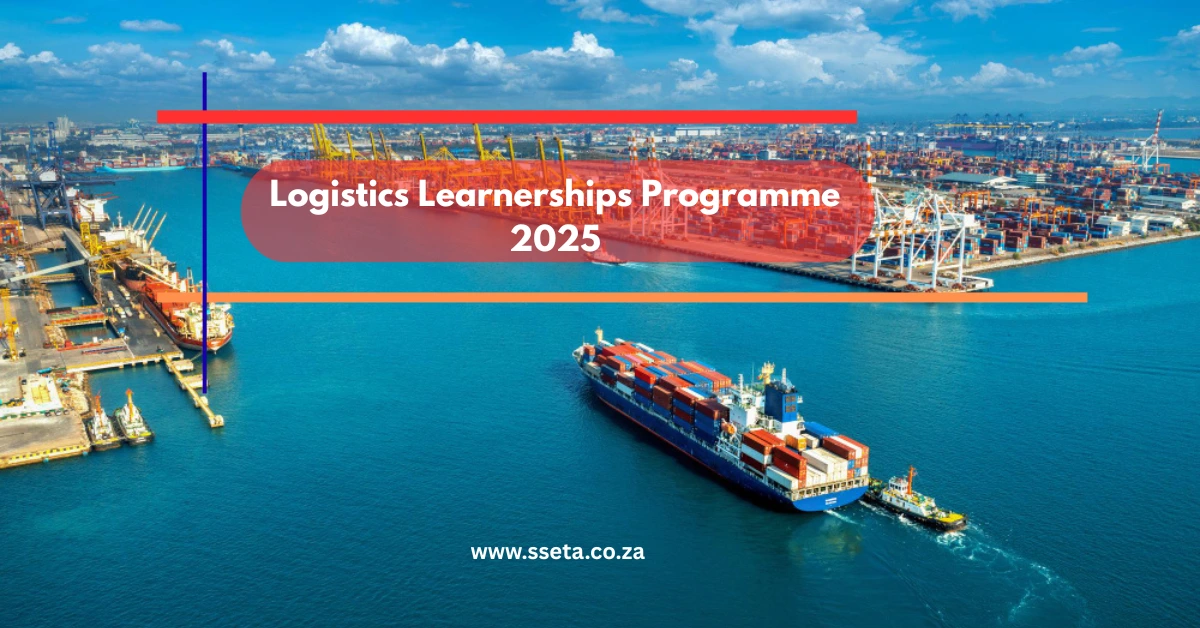In every modern economy, the smooth movement of goods is as important as the electricity that powers cities. From the food on supermarket shelves to the parts used in manufacturing plants, logistics is the hidden engine that keeps life running. But behind every successful delivery is a team of skilled professionals who know how to manage the complex dance of supply chains.
The Logistics Learnerships Programme 2025 is designed to open this world to aspiring professionals. By offering accredited training, valuable stipends, and hands-on workplace experience, the programme equips you with the knowledge and skills needed to build a sustainable career in one of the fastest-growing industries.
This guide takes you through what the programme is, why it matters, how to apply, and what doors it can open for your future.
What Exactly Is a Logistics Learnership?
A learnership is a structured work-based learning programme that blends theory with practice, leading to a qualification recognised by the South African Qualifications Authority (SAQA). In logistics, that means you will study the theory behind supply chain management, warehouse operations, freight handling, or inventory control—and then immediately apply it in a real-world workplace.
Think of it as “learning by doing”. For example:
- In the classroom, you might learn how to track shipments, manage stock records, or plan delivery routes.
- In the workplace, you could help manage an actual distribution centre, prepare consignments, or solve delivery challenges.
By the end, you not only understand logistics principles—you’ve lived them.
Why This Matters: The Power of a Logistics Qualification
A logistics learnership offers several life-changing benefits:
- A recognised qualification – Employers trust accredited certificates, especially those backed by SETA (Sector Education and Training Authority).
- Hands-on experience – You don’t just study; you work in the industry from day one.
- Financial support – You receive a monthly stipend to help with travel, meals, and daily expenses while you train.
- Better employment prospects – Many learners are offered permanent roles by the companies where they train.
- In-demand skills – Logistics and supply chain jobs are among the most secure, thanks to the constant need for goods movement.
Who Can Apply? Understanding the Eligibility Criteria
The Logistics Learnership Programme 2025 is generally open to South Africans who meet basic requirements:
- Education: Grade 12/Matric certificate (some positions accept equivalent qualifications).
- Age: Often between 18 and 35, though some employers may extend this.
- Citizenship: South African ID or valid work permit.
- Skills: Basic computer literacy, numerical skills, and an organised mindset are advantageous.
- Attitude: Eagerness to learn, adaptability, and a professional approach to work.
Tip: Even if you don’t have direct logistics experience, your organisational ability, problem-solving skills, or willingness to learn can make you a strong candidate.
Inside the 2025 Programme: What to Expect
Accreditation and Industry Recognition
One of the most important factors to check before applying is whether the programme is SETA-accredited. Accreditation ensures that your qualification is valid, respected by employers, and recognised nationwide. Common qualifications linked to logistics learnerships include:
- National Certificate: Freight Handling
- National Certificate: Supply Chain Management
- National Certificate: Warehouse and Distribution
Accreditation means that every hour you spend learning counts towards a future you can build on.
Financial Support Through Stipends
The stipend—usually paid monthly—helps you focus on learning without worrying as much about daily expenses. While amounts vary, they generally range from R3,000 to R5,000 per month. Some employers go further, offering:
- Travel allowances
- Uniforms or safety gear
- Meals during shifts
This support is not just financial—it’s a sign that companies value your contribution even as a learner.
Programme Duration and Structure
Most logistics learnerships last 12 to 24 months, split between:
- Theoretical training – Delivered in classrooms or online, covering supply chain principles, safety standards, and logistics technology.
- Practical workplace training – Real tasks in warehouses, transport hubs, and corporate offices.
A typical week might look like:
- Monday–Tuesday: Classroom training (theory, assignments, group projects).
- Wednesday–Friday: Workplace shifts applying skills on the ground.
By alternating between theory and practice, you reinforce what you’ve learned and see its real-world value instantly.
How to Apply
Attend Onboarding: Submit final documents and finalize stipend accounts.
Prepare Documents: Matric certificate, ID copy, CV, cover letter.
Search Vacancies: Check DSV Careers or platforms like GILE Jobs, SAIndeedJobs
Apply Online or Email: Often to Learnerships@za.dsv.com, attaching all documentsTrack Status: Respond promptly if shortlisted for tests or interviews.
How to Stand Out as a Candidate
- Tailor your CV to highlight organisational skills, teamwork, and problem-solving.
- Research the company—know their main services and values.
- Show a learning mindset—employers value curiosity and adaptability.
- Practice interview answers for questions like:
- “Why logistics?”
- “How do you handle tight deadlines?”
- “What would you do if a delivery was delayed?”
Career Paths After Completion
Completing a logistics learnership opens multiple entry-level roles:
- Warehouse Assistant – Receiving, packing, and organising goods.
- Inventory Controller – Managing stock levels and records.
- Logistics Coordinator – Planning deliveries and routes.
- Dispatch Clerk – Managing outgoing shipments.
- Supply Chain Assistant – Supporting broader supply chain functions.
From there, you can work towards supervisory and management roles or branch into specialised fields such as import/export management, cold chain logistics, or supply chain analytics.
Why the Industry Needs You: Growth and Opportunities
South Africa’s logistics sector is a key driver of trade, with increasing demand for:
- E-commerce delivery networks
- Faster, more efficient supply chains
- Sustainable transport solutions
Globally, the logistics market is expanding, meaning your skills could even open doors internationally. As industries become more interconnected, supply chain professionals are not just needed—they are essential.
Taking Your Skills Further: Logistics Learnerships Programme 2025
Your learnership is just the start. After completion, you might choose to:
- Pursue a higher certificate, diploma, or degree in logistics or supply chain management.
- Gain professional certifications from bodies like SAPICS (The Professional Body for Supply Chain Management).
- Specialise in niche areas such as freight forwarding, port operations, or customs compliance.
With each step, your earning potential and career stability grow.
Final Word: Why You Should Apply Now
The Logistics Learnerships Programme 2025 is more than just a training opportunity—it’s a launchpad into a high-demand career. By combining accredited education, workplace learning, and financial support, it offers a solid pathway for young South Africans to enter an industry that keeps the world turning.
If you meet the requirements, prepare your documents, and apply with purpose, you could be part of the next generation of professionals keeping goods—and economies—moving.
Your journey into logistics doesn’t just start with learning. It starts with applying. The sooner you step in, the sooner you start moving forward.


